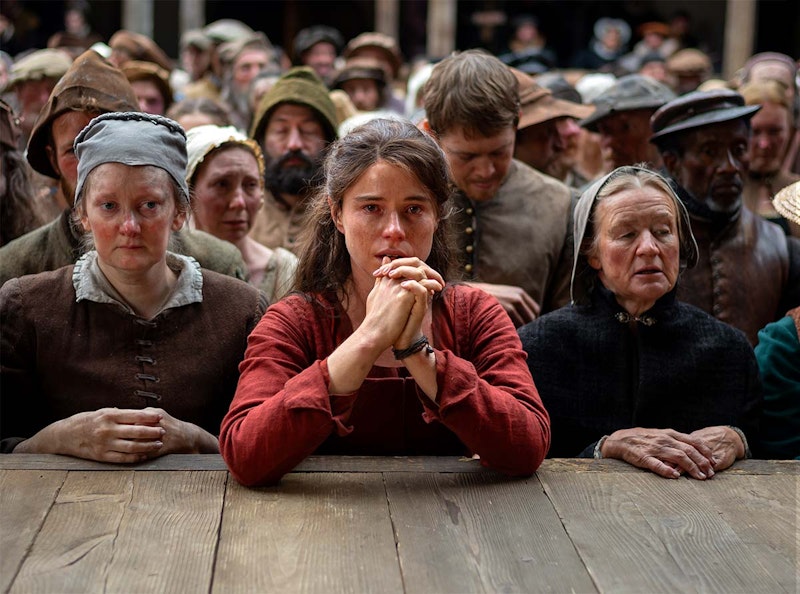Hamlet is difficult play to adapt on the big screen because of its length, complexity, and downbeat conclusions about the nature of revenge. A fully-articulated, literal translation of the material isn’t any more effective than a live theatrical production would be, even if Laurence Olivier’s star-studded 1948 version did win the Academy Award for Best Picture (a baffling decision, given it was the same year of The Red Shoes and The Treasure of the Sierra Madre). The best derivative works of Hamlet have been those that’ve isolated and expanded on individual components, such as the satire Rosencrantz and Guildenstern Are Dead or the animated reimagining in The Lion King. That’s not to discount the countless stories that have recontextualized key moments from Hamlet for their own purposes; last year, Dune: Part Two featured a duel between Paul Atreides (Timothee Chalamet) and Feyd-Rautha (Austin Butler) that mirrored the final confrontation of Hamlet and Laertes.
Maggie O’Farrell’s 2020 novel Hamnet attempted to cut through the political double-crossing within the story to focus on the theme of grief, which mirrored an actual tragedy where Shakespeare and his wife Agnes lost their young son prior to the play’s inception. Although it’s not the first time that there’s been a creative reimagining of Shakespeare’s life, Hamnet isn’t peppered with the literary illusions and whimsical references of Shakespeare in Love. Instead, its implication is that Hamlet was Shakespeare’s most personal work because it allowed him to channel his grief into a timeless story. However, the fact that Hamlet so nakedly mirrored his own family trauma would imply that Shakespeare’s marriage never recovered because he wasn’t able to commune with his wife in any other way than through storytelling.
The cinematic adaptation of Hamlet is from director Chloe Zhao, who may have experienced the most radical career fluctuations in recent years of any young filmmaker. It was after her breakthrough neo-western drama The Rider that Zhao earned the industry’s most coveted prize, and also experienced one of its most embarrassing failures; while she became the second woman to ever win Oscars for Best Picture and Best Director with Nomadland, her Marvel film Eternals became the worst entry in a franchise that had been running strong since 2008. These dramatic scenarios seemed to reveal precisely where Zhao’s talents lie; although she’s been able to spotlight unsung communities with thoughtful intimacy, her attempts to conceive mythological worldbuilding have resulted in flat, lifeless narratives.
Those skills and deterrents are made clear in Hamnet, which is a great romantic drama and a shallow analysis of one of the most recognizable texts in history. Despite being set in the late-16th century, Hamnet is devoid of the pompous, grandiose spectacle of a standard period piece. Like Nomadland, it’s a film set on the outskirts of society, where characters have led meager lives and are susceptible to nature’s grace and wrath. The relationship between William (Paul Mescal) and Agnes (Jessie Buckley) isn’t a sweeping romance, but rather a simmering attraction from two people who seek lifelong companionship.
The chemistry between Mescal and Buckley is muted, even if Hamnet is able to get fairly steamy for a PG-13 film. Zhao’s best decision is to ignite their passion only after they have children; William and Agnes may have been a moderately happy couple, but they find mutual infatuation with one another when they share the responsibility of rearing three children. As with any classic weepie, Hamnet is as aware of its inevitable gut-punch as the viewers are. The knife is carefully twisted throughout the childhood of William and Agnes’ son, Hamnet (Jacobi Jupe), but that doesn’t mean that his death is any less affecting.
Given the strong foundation of the performances, Hamnet is able to spend the majority of its 126 minutes on the suffocating stages of grief experienced by Will and Agnes as they make vain attempts to move on. Although Will disappears for a majority of the film’s second half, Mescal is given a powerful scene in which he’s confronted with his son’s lifeless body. Had Zhao’s film been dedicated solely to the lyrical, naturalistic observations of parental grief and resilience, it may have made for a strong spiritual successor to Nomadland. The difference is that Zhao’s Best Picture winner had a component of discovery when it came to the depiction of an active community. Hamnet isn’t only an interpretation of a period in history caked with ambiguities, but orchestrated towards an inevitable conclusion intended to have maximal emotional payoff.
Hamnet doesn’t fully belong to either William, Agnes, or Hamnet himself. Buckley’s performance is worthy of the accolades that it’ll likely receive, but she’s framed as a canvas to pile misery upon. Hamnet may be an attempt to simulate a more impressionistic version of human behavior than what’s commonly seen in Renaissance-era stories, but it can’t help but incorporate a few stray allusions to the most iconic passages from Hamlet.
Hamnet’s culmination is of course with the play itself, where the audience is called upon to look at the story through the eyes of Agnes. Buckley’s reaction to the onscreen death of an actor meant to look like her son may be heartbreaking, but it doesn’t reveal anything new about her characterization, given that the relationship she’s shared with Will has become so opaque. Will’s appearance within the play itself, where he’s taken on the role of the ghost, is another emotionally galvanizing choice that isn’t thematically linked to his character arc.
Hamnet is a collection of powerful performances, moments, and literary analysis that’s often affecting, but rarely cohesive. Not only are the final moments reliant on the power of the original play, but the utilization of Max Richter’s now-famous track “On The Nature Of Daylight” (also used in Arrival, The Last of Us, and Shutter Island among many others) is proof of Hamnet’s excesses.

